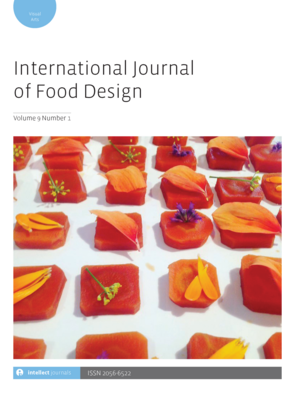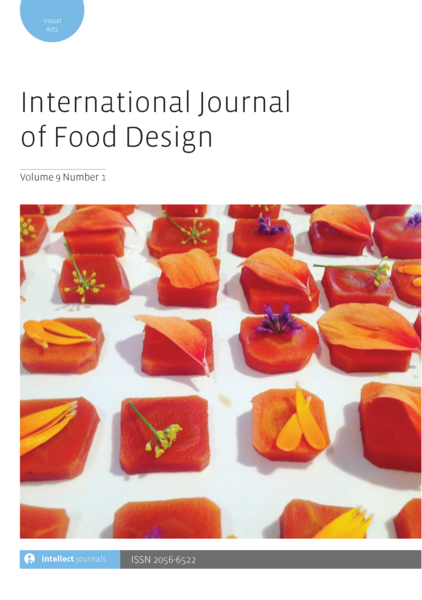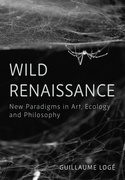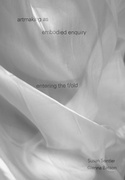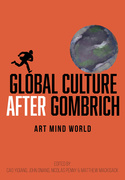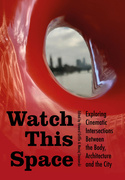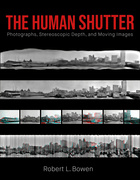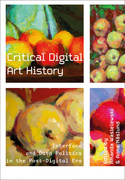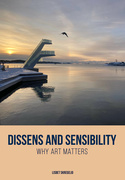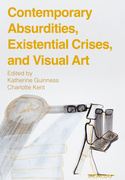All submissions must include a signed Open Access publishing agreement giving us your permission to publish your paper should it be accepted by our peer review panel for inclusion in volumes 4–9.
General Call for Papers
All articles submitted should be original work and must not be under consideration by other publications.
The International Journal of Food Design is interested in pushing the boundaries of research that connects aspects from culinary arts, hospitality, food science, food culture, food marketing, eating behaviour and any other food discipline, with aspects from design theory, design education, industrial design, design history and any other design discipline. The journal welcomes contributions on, but is not limited to, topics such as food product design, food packaging, design for food, design with food, interior design, food events, sensory design, food system design, food service/management, food design history, food design theory and food design education.
The International Journal of Food Design is interdisciplinary and transdisciplinary: we welcome articles relating to more than one area of knowledge, articles that create bridges between disciplines, and articles that result from research teams made of scientists with unique expertise all contributing to the same research endeavour. The journal welcomes research articles, literature reviews, case studies and book reviews.
Journal contributors will receive a free PDF copy of their final work upon publication.
Special Issue Call for Papers
Special Issue: 'Playing with food: Designing playful, magic and otherwise awe-inducing food experiences'
Guest editors:
Ferran Altarriba Bertran
Yoram Chisik
Jialin Deng
Carlos Velasco
Timeline:
Submissions open: beginning of February 2025
Submission deadline: end of October 2025
All submissions will go through the journal's peer-review process.
Call for participation
We invite submissions for the upcoming Special Issue of the International Journal of Food Design (IJFD) on ‘Playing with food: Designing playful, magic and otherwise awe-inducing food experiences’. This Special Issue explores the intersection(s) of food and play, inviting explorations that investigate the processes involved in crafting playful food experiences. Importantly, we embrace an open-ended idea of what it means to ‘play’: we do not limit the scope of our Special Issue to narrow understandings of games and play, but rather open up our perspective to embrace both the playful and the gameful, the joyful and the magical, as well as anything that might otherwise engender awe-inducing experiences with, through and/or around food.
We envision a Special Issue that brings together works investigating topics such as (but not limited to) interactive meals, food-based art installations, multisensory-driven experiences and both technology and non-technology-mediated food-play. Though we anchor the Special Issue around the field of design research, we welcome contributions from a broad range of perspectives: we invite researchers in any gastronomy- or food-related domain to submit their work. We also encourage other practitioners such as designers, technologists, chefs and any other creators in the field of gastronomy to submit their work for consideration – though we advise them to collaborate with active researchers to ensure their submissions meet academic standards and rigour. The following list highlights some (but not all) of the themes we’d like to address in the Special Issue:
Theory
- Works positioning food and food practices within existing theories of play, ludology and interactions (and vice versa).
- Studies of the socio-cultural dimension of (and overlaps between) food and play.
- Critical inquiries into the role, benefits and potential risks of integrating play and/or playful technology in food practices.
- Analyses of historical accounts of food-play.
Food-play arts and design
- Design cases of food-related games, playful food installations, playable foodware and/or food-related artistic work (technological or non-).
- Multisensory and/or immersive food experiences.
- Reflexive accounts of design processes involving food and play.
- Case studies of commercial food-play design projects involving restaurants, food retailers, manufacturers and/or other food industry stakeholders.
- Food-play design for societal and/or pro-environmental impact.
- Explorations of AI for playful food development and design.
- Experiments with food as an interactive material.
Food-play design and research methods
- Methods for designing playful food experiences.
- Methods for converging playfulness with other values in food design (e.g. social justice, sustainability, etc.).
- Playing with food as a design/research technique.
Submission guidelines
The International Journal of Food Design (IJFD) is the first academic journal entirely dedicated to food design research and practice. This journal is a platform for researchers and practitioners operating in the various disciplines that contribute to the understanding of food design, design applied to food and eating or food and eating investigated from a design perspective.
Within that scope, this Special Issue pursues to advance designers' knowledge of the overlaps between food and play. Regardless of the theme, contribution type and format, our expectation is that the submissions push forward our understanding of the role of play and playfulness (understood in broad terms as indicated by the themes above) in the context of food and food practices. To achieve that, submissions may take the form of empirical research papers, reviews of existing work (let it be academic literature and/or design practice), case studies of design processes, theoretical essays or any other relevant form.
Regarding format, submissions may be shaped as traditional papers or as pictorials. In both cases, submissions must include two documents:
First, an article file, including:
- The article's title.
- No authors’ names.
- An abstract of 200 words which will be featured on the publisher's website (Intellect).
- Six keywords (words or two-word phrases).
- The complete article text, including Figures and Tables.
- The reference list. References to the author’s own work may be replaced by anonymous references, such as (Author, 2012), to ensure double-blind reviewing.
Second, a separate supporting document submitted alongside the article, including:
- The article's title.
- The authors' names.
- The authors' ORCID identifiers. This must be supplied in the following format: https://orcid.org/0000-0002-1825-0097. If you do not yet have an ORCID identifier, please register here: https://orcid.org/register.
- The authors' addresses – the submitted material should include details of the full postal and e-mail addresses of the contributor for correspondence purposes.
- The authors' biographies – authors should include a short biography of around 100 words per author, specifying their work field, interests and affiliations.
- Any acknowledgements, if necessary.
Please use the following file-naming conventions when submitting your articles:
● The article file submitted by Smith: IJFD_art_Smith.doc
● The supporting document file submitted by Smith: IJFD_sd_Smith.doc
Specific guidelines for papers:
A research paper typically consists of an Introduction, Method, Results and Discussion section – though authors are encouraged to be flexible with that structure if that enables a better presentation of their work. The content of research papers must generally not exceed 10000 words – but not including the author biography, keywords, abstract or references.
Specific guidelines for pictorials:
Pictorials are research papers where visual content is at least equally important as text (if not more) in the construction of the paper's argument. Authors working on a pictorial must still use the same Intellect template as paper authors. However, they are free to use as many (and as large, up to a double-page spread) images as they need. The first page of the pictorial and the references page(s) must maintain Intellect's House Style for papers, but authors can reappropriate the rest of the pages by making them images rather than the body of text. Unfortunately, full landscape submissions are not allowed per Intellect's publishing policy.
For additional information about the submission guidelines, please have a look at the documents linked below. If, after reviewing those documents, you still have further questions, please feel free to contact the Special Issue editors.
● IJFD's notes for contributors: https://www.intellectbooks.com/asset/82780/1/IJFD_9_1_NFCs.pdf
● Intellect's House Style guide: https://www.intellectbooks.com/journal-editors-and-contributors
Once ready, submissions can be made by email to Ferran Altarriba Bertran at ferran.altarriba.bertran@eram.cat
Guest editor bios:
Ferran Altarriba Bertran is an associate professor at Escola Universitària ERAM (Salt, Catalonia). He is also affiliated with the Gamification Group at Tampere University (Finland). Ferran’s work explores how to co-design technologies and experiences that support ways of living that are both joyful and caring. As part of that research, he explores how experiences of eating, cooking, sourcing and disposing of food can be imbued with an element of playfulness. Ferran’s work has been published in high-impact journals and conferences in the areas of food design, design research and human-computer interaction. He is a member of the International Journal of Food Design’s editorial board. www.ferranaltarriba.com
Yoram Chisik is a senior lecturer and co-program lead for the MSc in user experience (UX) engineering at Goldsmiths, University of London. His work explores the ways in which people interact with and through technology and the means through which the physical and the digital can be woven together to create novel experiences. Yoram has served as chair and editor for several academic conferences and journals in human-computer interaction and design. His work has been published in high-impact conferences, journals and edited volumes. In addition, Yoram has advised companies and government agencies and has taught at several universities around the world.
Jialin Deng is a researcher, designer and art practitioner pursuing her Ph.D. in human-computer interaction (HCI) at Monash University, Australia. Her research explores the future of radical interfaces that are comestible and computable, blending arts, science, gastrophysics and interaction design. Her works have been featured at the London Design Festival, Science Gallery Melbourne and leading media outlets such as FRAME, Forbes, Dezeen and ABC Radio National. Jialin also served as a guest editor for Special Issues for the International Journal of Gastronomy and Food Science. For more information, visit https://www.jialindeng.xyz/.
Carlos Velasco is an associate professor at the Department of Marketing, BI Norwegian Business School (Norway), where he co-founded the Centre for Multisensory Marketing. Carlos received his D.Phil. in Experimental Psychology from Oxford University. His work is at the intersection between psychology, marketing and human-computer interaction, and focuses on understanding and capitalizing on our multisensory experiences and their guiding principles. Carlos has worked with a number of companies from around the world on multisensory experiences. For more information, visit www.carlosvelasco.info.

